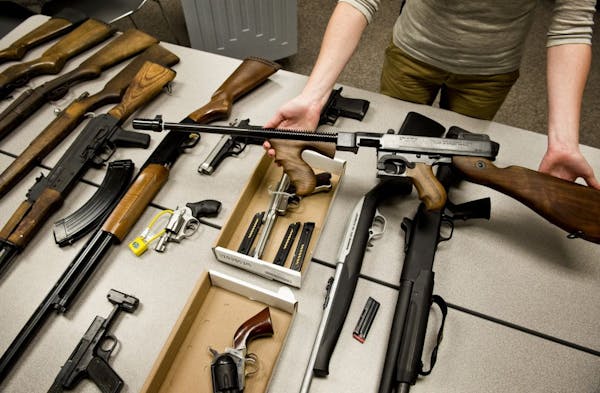Top law enforcement officials in Minnesota demanded Wednesday that legislators overhaul the state's faulty background check system for people seeking to buy firearms and reform a broken justice system that mistreats the mentally ill and places the public at heightened risk.
"For Minnesota, this is a public health issue and public safety issue," said Hennepin County Sheriff Rich Stanek. "We believe gun control alone will not solve the complex problems of guns and extreme violence. We have an 'access' problem when it comes to guns -- the severely mentally ill should never have access to guns."
The proposed reforms were largely in response to a Sunday Star Tribune article on how a 32-year-old Carver County man -- who murdered his mother in 1995 at age 14 -- was able to legally get a permit to buy firearms despite his long history of mental illness.
The case of Christian Oberender described how Minnesota's criminal background check system failed on all levels to prevent him from being issued a permit last May. The newspaper found that a faulty information system among law enforcement, Carver County court administrators, the mental health system and a database operated by the Minnesota Bureau of Criminal Apprehension allowed Oberender able to assemble an array of 13 firearms before he was arrested three weeks ago.
A Star Tribune review of state court records also found that at least 84 people have been charged since 2000 with illegal gun possession or assault with a dangerous weapon even though they had previously been committed by a judge as mentally ill. Of that group, 29 were charged with multiple counts of weapons possession and nine were considered by a judge to be mentally ill and dangerous.
Stanek, along with Hennepin County Judge Jay Quam and Carver County Sheriff Jim Olson, were among a coalition of prosecutors, police chiefs and a bipartisan group of lawmakers that held a packed news conference near the Capitol to outline their proposals.
They said they were determined to influence public policy reforms when it comes to gun access and treatment of people with mental illness.
State Sen. Ron Latz, DFL-St. Louis Park and chair of the Judiciary and Public Safety Committee, voiced strong support for his coalition's proposals, referring to when he worked as a lawyer in the attorney general's office to ensure that the mentally ill under state care received proper medications. "The confluence of mental health issues and guns is very unnerving," Latz said.
Perhaps no other person in the state's judicial system sees that situation more often than Quam. For the past three years, he has presided over the county's Mental Commitment Court.
"These reforms can't come too soon and continuing to make excuses cannot be tolerated," Quam said before the news conference. "From my vantage point I see people with mental illness wasting away without adequate treatment throughout the entire system."
Major reforms the group is seeking include:
• Improving the Minnesota Bureau of Criminal Apprehension's (BCA) crime history database. The database, which contains more than 2 million criminal history files, has more than 168,000 that lack complete criminal history from time of arrest to the disposition of a case, the Star Tribune found.
This incomplete record system undermines the National Instant Check System that licensed gun retailers use to conduct background checks prior to purchase of firearms.
The coalition wants conviction records shipped to the BCA within 24 hours. Under Gov. Mark Dayton's proposed budget, the state database would be overhauled at a cost of nearly $11 million over the next four years.
• Giving law enforcement officers better access to critical mental health court records when they respond to 911 calls. Currently, officers regularly respond to calls, such as domestic disputes, without access to this information.
• Streamlining mental competency procedures for people in jail. Judges say a backlog exists that harms those in need of treatment. Periods between hearings can take weeks or months, further causing their condition to deteriorate.
The group also wants to change Minnesota's civil commitment laws. At present, courts may order mental health treatment only when a person has been determined by law to be a danger to themselves or others.
The group says the state should move to a "need-for-treatment" standard that has been adopted in 27 other states. This would allow for quicker treatment, rather than remaining in jail.
• Strengthening community treatment programs for the mentally ill. This is a program commonly referred to as Assertive Community Treatment. Judges and sheriffs say that once a court has found that an individual is incompetent to stand trial, the person should be moved out of jail and into an adequate care and treatment environment.
Stanek said treatment of the mentally ill is a key factor in curtailing gun violence.
"I want to caution that when treated, the mentally ill are no more likely to become violent than the general population," he said.
"But experience shows that the untreated are significantly more likely to become violent and also become victims of crime themselves."
The Minnesota spokesperson for the National Rifle Association was not available for comment.
Paul McEnroe • 612-673-1745
Minneapolis City Council declines to endorse Frey's Third Precinct plan
Minneapolis will bid to host Sundance Film Festival

Clash brewing over proposed Lino Lakes development that includes mosque
In heated western Minn. GOP congressional primary, outsiders challenging incumbent

